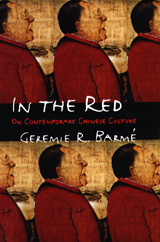GOLDSEA | ASIAN BOOKVIEW | NONFICTION
In the Redby Ceremie R Barme
Columbia University Press, New York, 1999, 512pp, $26
A narrative history of Chinese culture during the past two decades as seen from an East European perspective.
EXCERPT:
 enerally, when compared with intellectuals in the Soviet Union or Eastern Europe, the Chinese (and here perhaps we should include Taiwan and the newly "liberated" Hong Kong as well) appear in less than favorable light. In the 1980s Bo Yang and Lung-kee Sun were particularly outspoken in regard to what they perceived of as being the "fatal flaws" of Chinese intellectuals, be they on the mainland or elsewhere. Thus it became something of a commonplace that the Chinese intelligentsia had a more compliant attitude toward the day-to-day rule of totalitarianism/authoritarianism than did intellectuals in Eastern Europe (the cultural pedigree and role of gleeful "self-abasement" described in chapter 10, "To Screw Foreigners Is Patriotic").
enerally, when compared with intellectuals in the Soviet Union or Eastern Europe, the Chinese (and here perhaps we should include Taiwan and the newly "liberated" Hong Kong as well) appear in less than favorable light. In the 1980s Bo Yang and Lung-kee Sun were particularly outspoken in regard to what they perceived of as being the "fatal flaws" of Chinese intellectuals, be they on the mainland or elsewhere. Thus it became something of a commonplace that the Chinese intelligentsia had a more compliant attitude toward the day-to-day rule of totalitarianism/authoritarianism than did intellectuals in Eastern Europe (the cultural pedigree and role of gleeful "self-abasement" described in chapter 10, "To Screw Foreigners Is Patriotic").
More than three decades ago, Benjamin Schwartz summed up what he regarded as being the general underpinnings of this view: "The ardent cravings for a sense of national dignity, the deep spiritual insecurity, the long tradition of authoritarianism, the orientation toward state service, the rejection of 'capitalist' values, etc, would all appear to have created preconditions [among intellectuals] for a complaisant attitude toward the Communist state." Schwartz himself argued against accepting this view, yet it is one that is still endlessly proffered by Chinese writers and China specialists, despite past evidence and the testimony of recent events that such a simplistic analysis deserved serious reconsideration.
This is not to say that mainland cultural commentators all failed to turn their attentions to socialist culture. From the mid- to late-1980s, the art critic Li Xian-ting (also known by the pen names Hu Cun and Li Jiatun), literary critics like Zhu Dake, Liu Xiaobo, and Li Jie, and the journalist-historian Dai Qing were among a small but highly public group of writers who touched on various aspects of this new form of civilization. In the fields of political science and history, a number of writers have been involved in this enterprise while generally being careful to maintain their credentials as participants in mainstream intellectual discourse. In the late 1980s, fringe critics and rogue thinkers were few in number, or simply not vocal enough to be heard. But perhaps the desire to be heard, loud and often, forced some of the more original and perceptive minds to speak ou in the "space between the lines". Nonetheless, faced with something of a dearth of indigenous critiques for China's socialist culture, it is beneficial to cast an eye westward for prescient analyses of the situation in China's European soul mates. While being sorely aware of the national, historical and cultural differences between China and Eastern Europe's socialist experience, Mikos Haraszti's work is one of the most insightful, albeit irreverent and often tongue-in-cheek, gudies to mainland China's post-1976 "new age" of culture.

AN IRON FIST IN A VELVET GLOVE
Deng Xiaoping advanced a new policy on the arts at the opening session of the Fourth Congress of Chinese Writers and Artists in October 1979. It was the first time that such a gathering had been convened since the Cultural Revolution. Many who had participated in the previous congress had not survived the intervening years. Deng addressed the meeting, and his statement was hailed as epoch making:
We must persevere with Comrade Mao Zedong's policy to ensure that our literature and art serves the broad masses of the People. First and foremost, it must serve the workers, peasants, and soldiers. We must persevere with the policies of allowing a hundred flowers to blossom, abandon the old in favor of the new, use foreign things to serve China, and make the past serve the present. In terms of cultural creation, we advocate the free development of different styles and genres. In the realm of cultural theory, we advocate free debate between different points of view and academic schools.
ASIAN AIR ISSUES FORUM |
CONTACT US
© 1999-2003 GoldSea
No part of the contents of this site may be reproduced without prior written permission.
